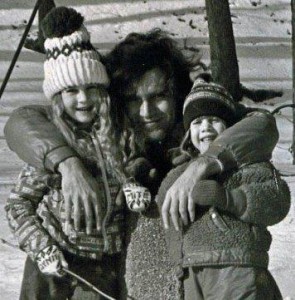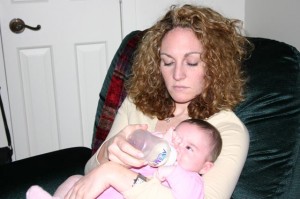By Guest Blogger Liz Wiener
When I was a kid, I couldn’t go to sleep unless I completed a very specific set of nightly routines. I was inexplicably terrified of water dripping from the bathroom tap, so I worked at tightening the faucet until I was sure I was safe. The bathroom light switch had to be flicked on and off exactly 10 times. Each item on my shelves and desk needed to be perfectly aligned and I felt compelled to yell, “Goodnight Ma!” from my bed at least a dozen times.

School was difficult. I loved to use black crayons when I coloured, pressed hard, black-magic style, because a perfectly uniform, velvety black surface was infinitely preferable to visible streaks of colour. Erasing was unacceptable. I hated seeing faint traces of mistakes on my papers. I cried a lot.
Overcome by a puzzling sadness, I would sit at my desk, tears streaming down my face, until my teacher sent me to the nurse who would take my temperature and then send me back to class.
Play dates away from home were challenging, and sleep-overs impossible. Once in a while I would try, only to sneak to a phone in the middle of the night, begging my parents to pick me up. Sleep away camp was out of the question. Even traveling with my family threw me off. Away from the comfort and security of my routines, I was an anxious, sleepless mess.
As I got older, the storm in my head subsided. Distracted by boys and a new-found social life, high school was easier. My anxiety’s focus was academic. Tests and exams sent me into a tailspin. Despite being an A student, I was always sure I’d failed. University was worse and exam periods and deadlines meant no sleep, no appetite, and endless crying jags.
At 24, my then-boyfriend (now husband) and I got engaged. When initial joy and excitement wore off, I started to feel the descent of that familiar puzzling sadness. I couldn’t eat. I would lie awake in the middle of the night, my heart and mind racing. I could barely get myself out of bed to go to work. All of this was compounded by crushing guilt.
How could I feel so miserable when I had everything – a loving fiancé, a supportive family, a job I loved and a new house? I felt like a terrible person.

My father, who knew that I was in a particularly dark place, finally pushed me to see a doctor, a colleague of his, to rule out any underlying medical issues. When my blood tests came back perfectly normal, I was devastated. I was hoping for a quick answer and a quicker fix. A thyroid issue, maybe. A hormonal imbalance would have been great. I burst into tears in the doctor’s office. Then she gently suggested that I was suffering from chronic depression and anxiety and explained that a combination of medication, therapy and exercise could be enormously helpful.
After three weeks on a SSRI, a medication designed to treat depression by changing the balance of serotonin in the brain, I was a new person. I was sleeping and eating. The persistent feeling of impending doom diminished. I also found a therapist who used cognitive behavioral therapy and gave me techniques to use when my anxiety threatened to get out of control. And while I always loved to exercise, it became an essential and non-negotiable part of my routine.
There have been setbacks over the years. I was afraid to have babies born with withdrawal effects from my medication, so I gradually weaned off during my two pregnancies. The postpartum periods were consequently rough, especially after my youngest was born when I seriously contemplated packing a bag and leaving. My father’s illness and death was another challenging period, one that required a visit to a psychiatrist and a medication adjustment. September is always a bad month. The drastic change in routine, the return to school and work and the anniversary of my father’s death weigh heavily on me, every year, without fail.

By now, I’ve accepted, that for genetic, chemical or situational reasons, I’m at a predisposition for anxiety and depression.
I’ll be on medication for the rest of my life and I’m ok with that. I will also chase the endorphins of exercise because they make a huge difference in how I feel, both physically and mentally.
Above all, and most importantly, I’ve learned that I have control over how I feel.
I don’t have to be held hostage by depression and anxiety because I have the tools to help me put one foot in front of the other when things seems bleak.
Feeling sad and down in the dumps once in a while is a normal reaction to life’s ups and downs. But if a sense of emptiness and despair become persistent and begin to interfere with your daily functioning, then it’s time to be proactive. Similarly, If you see signs or symptoms of depression in a friend or family member, encourage them to get help:
- Start by seeing your family doctor to rule out any medical issues.
- Don’t isolate yourself. Gather support from the people around you.
- Be active! Regular exercise has been proven to ward off feelings of depression and anxiety.
- See a therapist.
Our news feeds are regularly flooded with devastating stories about depression. Kurt Cobain, Alexander McQueen and Robin William’s suicides, among so many others, are heartbreaking reminders that depression is an illness that can be as devastating as cancer.
But not every depression story ends tragically.
With the right treatment, medication and support, there’s a light at the end of the tunnel and the opportunity to lead a healthy, happy life – which may or may not include a few too many bootcamp classes.
—
About Liz Wiener

Liz Wiener is the co-creator of one of Montreal’s foremost women’s lifestyle blogs, Wise Women Montreal, which provides women with everyday wisdom to help them lead extraordinary lives. When she’s not blogging, taking care of her three kids, her husband and her dog, Liz also works as an educational consultant who specializes in strategic tutoring. Liz also has experience as a makeup artist and a personal stylist and has a passion for fashion, exercise, 80s on 8, and the perfect Dirty Martini.
—
Do you know that November continuously sees the highest rate of suicide out of all the months of the year? Fall also sees increased cases of Seasonal Affective Disorder (SAD), and many begin to slip into a rut. We shared Liz’s story today in hopes of shedding light on depression and decreasing the stigma. I also shared Liz’s story in hopes that if you recognize parallels in the above with you or your loved ones, this might serve as your push off the fence to seek help. Please share Liz’s story.
And please feel free to leave Liz a comment… she will be reading.





This was a wakeup call because I see my sister in your story. Thank you for sharing your story so bravely and I am sending this article to her right now.
Thank you, Katie! I hope my story will help your sister.
I identify so much with your story! The strongest and perhaps most important piece is your statement of having tools to help deal with this illness when it rears its ugly head. Thank you for speaking up.
With (finally) correct diagnoses of major depressive disorder; and prolonged chronic p.t.s.d. I suffer from depression; am in depression now. Brain says “let’s check out” however, my soul says “let’s stay another day” and I am determined to fight and remain here until my body says it’s time to check out.
I do not know if there are any other Rx’s to help aide me in not feeling so suicidal every day; take clonopin at bedtime and also during day only if totally necessary; (not good for memory that is fo sho); ummm, tried so many anti-depressants over decades; and first they work, then they stop working; this is one of the symptoms of anti-depressant treatment resistant depression – do not do well on anti-depressants. For two decades, was misdiagnosed until 3/2012 then correct above diagnoses. Would like to ask if anyone out there experiences a “light switch” coming on around April and depression lifting somewhat (not all the way); then in very late September “light switch” turns off, and depression once again worsens. I have a Sunbox lightbox; I take a Centrum multiv-vitamin and Caltrate with D; and I eat very healthily; is there anyone out there with any suggestions in which might help relieve some or all of depressive symptoms? Thank you oh so very much. Jade.
Was hoping for a reply. Thanks. Peggy “Jade” Ford